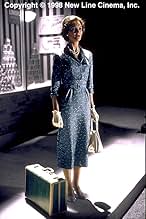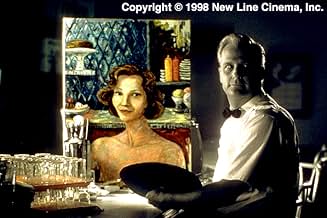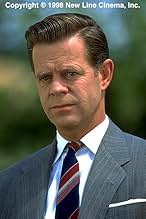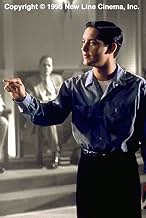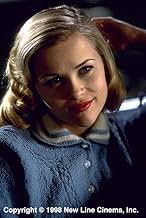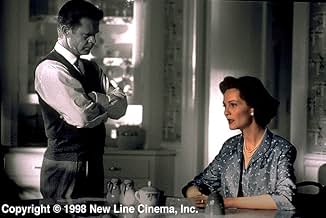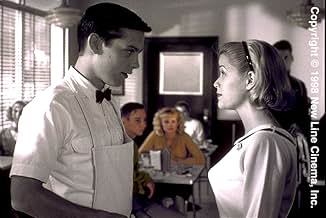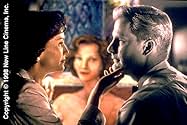1990 के दशक के दो भाई-बहन खुद को 1950 के दशक के सिटकॉम में पाते हैं, जहाँ उनका प्रभाव उस जटिल दुनिया को गहराई से बदलने लगता है।1990 के दशक के दो भाई-बहन खुद को 1950 के दशक के सिटकॉम में पाते हैं, जहाँ उनका प्रभाव उस जटिल दुनिया को गहराई से बदलने लगता है।1990 के दशक के दो भाई-बहन खुद को 1950 के दशक के सिटकॉम में पाते हैं, जहाँ उनका प्रभाव उस जटिल दुनिया को गहराई से बदलने लगता है।
- 3 ऑस्कर के लिए नामांकित
- 18 जीत और कुल 45 नामांकन
फ़ीचर्ड समीक्षाएं
Pleasantville should be nominated for Best Director and Best Cinematography, and perhaps Best Supporting Actor for William H. Macy. Joan Allen, Jeff Daniels and Tobey Maguire are also excellent, and the idea is brilliant. In other words, this film is one of the best of the year. It is fun for the eyes and filled with wonderful allusions to great books and other films, not to mention some similar events in our country's past. If you will let yourself go from reality and put a little thought into it, you will realize the sheer genius behind this film. The messages were plenty and appropriate, and while it is extremely fun to watch, it still is able to evoke deeper emotions. Fantastic, and my vote for second best film of the year behind Saving Private Ryan.
Two 1990s teenagers find themselves in a 1950s sitcom where their influence begins to profoundly change that complacent world.
This is a surprisingly strong role for Reese Witherspoon, who tends to be an overrated actress. If anything, she is actually underrated here for how well she made Jenny her own character. The appearance of Don Knotts is a great touch, and William H. Macy is wonderful as always.
While a simple concept (kids getting sucked into the TV), the execution is a work of genius. Writer-director Gary Ross used this backdrop to explore race relations, the "good old days", changing cultures and mores... and exploring a range of "right and wrong". And underneath it all, it still remains a sense of humor and does not attempt to guilt trip the audience.
This is a surprisingly strong role for Reese Witherspoon, who tends to be an overrated actress. If anything, she is actually underrated here for how well she made Jenny her own character. The appearance of Don Knotts is a great touch, and William H. Macy is wonderful as always.
While a simple concept (kids getting sucked into the TV), the execution is a work of genius. Writer-director Gary Ross used this backdrop to explore race relations, the "good old days", changing cultures and mores... and exploring a range of "right and wrong". And underneath it all, it still remains a sense of humor and does not attempt to guilt trip the audience.
David (Tobey Maguire) is a geek in high school. Real life is diminishing expectations, family divorce and no female companionship. He's obsessed with an old TV show Pleasantville. While watching a Pleasantville marathon, he has a fight with his twin sister Jennifer (Reese Witherspoon) and they break the TV remote. TV repairman (Don Knotts) shows up and give them a special remote which sends them into the show. They become George (William H. Macy) and Betty Parker (Joan Allen)'s kids Bud and Mary Sue. She's not happy until she sees her new boyfriend Skip Martin (Paul Walker). Bud is working at Bill Johnson (Jeff Daniels)'s soda shop. He falls for Margaret Henderson (Marley Shelton). The kids' interactions start changing the strange purity of Pleasantville and colors seeps into the world.
At first, this is a gimmick that has some cute aspects. Don Knotts adds to that sense of a cheap laugh. It has some good fun with Maguire and Witherspoon budding head. Then the deeper profound message seeps into the movie. It is gentle and yet undeniable. A couple of times, I feared the movie would push too hard like calling the people "color". It manages to maintain some distance and follow through on the message without overpowering it. This is quite a film.
At first, this is a gimmick that has some cute aspects. Don Knotts adds to that sense of a cheap laugh. It has some good fun with Maguire and Witherspoon budding head. Then the deeper profound message seeps into the movie. It is gentle and yet undeniable. A couple of times, I feared the movie would push too hard like calling the people "color". It manages to maintain some distance and follow through on the message without overpowering it. This is quite a film.
10adamw_13
Some critics here are saying the movie takes itself too seriously - but I believe some people are taking it too literally. ... Saying that the topics that are addressed have no impact on society anymore, clearly misses the point. ... The 50s -- or more specifically, 50s TV -- is used as a metaphor, because of the way 50s TV portrayed life in America. ... Thematically, this movie is about "Living Life" to the fullest, whatever that means. More specifically, to live life to the fullest -- to truly feel "alive" -- you need to take the good with the bad. Sweeping things under the rug and just acting "pleasant" all the time, is no way to live. That's what Tobey McGuire's speech at the end to his "real" mother is all about. Bad things happen, it's part of life. Having passion brings with it positives and negatives -- but suppressing true feelings for the sake of "pleasantness" is an empty life. THAT is the key ... and that "issue" is everlasting to the human condition.
Another point: People fear change. This is universal from the start of time until the end of time. The film suggests that changing and growing as a society and as people -- even if scary -- is good. Just because the 50s were used as a metaphor for that, don't believe for a minute this isn't a universal issue that exists today and forever.
Another issue common for people critical of this film is the sexual issue. They say that Gary Ross is promoting sexual promiscuity, sex out of wedlock, etc... Again, I believe it misses the point. Is Ross suggesting that premarital sex is OK? Yes, and I'd agree - and I'm sure there's plenty of people who don't agree with that, and that's OK too. But, again, the sex is just part of the theme - used as a high-profile example to making the overall point about "openness" - and not suppressing one's feelings. Note that the Reese Witherspoon character was already promiscuous, and her transformation was actually something completely different.
I can't make everyone like this film - I'll just say that, on a personal note, I was so floored by this film, I had to see it again the next day. That had never happened to me before, or since. Ross' commentary goes on to speak of everything I felt about the film when I first saw it. It was great to hear that his reasons for what he did, meshed exactly with how I took it. I had to write him a letter to tell him so - another thing I'd never done before or since.
This is not a perfect film. I liked its subtlety, but then the racism correlation, and the censorship stuff, got a bit more overt. The courtroom scene at the end is a bit cliche ... and I also agree with one poster who said that, to make the point about taking the good with the bad, we should've seen a bit more about the consequences of their actions.
Those are merely nitpicks in the grand scheme of things. This is a 10 out of 10.
Another point: People fear change. This is universal from the start of time until the end of time. The film suggests that changing and growing as a society and as people -- even if scary -- is good. Just because the 50s were used as a metaphor for that, don't believe for a minute this isn't a universal issue that exists today and forever.
Another issue common for people critical of this film is the sexual issue. They say that Gary Ross is promoting sexual promiscuity, sex out of wedlock, etc... Again, I believe it misses the point. Is Ross suggesting that premarital sex is OK? Yes, and I'd agree - and I'm sure there's plenty of people who don't agree with that, and that's OK too. But, again, the sex is just part of the theme - used as a high-profile example to making the overall point about "openness" - and not suppressing one's feelings. Note that the Reese Witherspoon character was already promiscuous, and her transformation was actually something completely different.
I can't make everyone like this film - I'll just say that, on a personal note, I was so floored by this film, I had to see it again the next day. That had never happened to me before, or since. Ross' commentary goes on to speak of everything I felt about the film when I first saw it. It was great to hear that his reasons for what he did, meshed exactly with how I took it. I had to write him a letter to tell him so - another thing I'd never done before or since.
This is not a perfect film. I liked its subtlety, but then the racism correlation, and the censorship stuff, got a bit more overt. The courtroom scene at the end is a bit cliche ... and I also agree with one poster who said that, to make the point about taking the good with the bad, we should've seen a bit more about the consequences of their actions.
Those are merely nitpicks in the grand scheme of things. This is a 10 out of 10.
10Eddie C.
I knew what this film would be about before I rented it, but I'm stunned that it would be THIS good. Nothing against "Saving Private Ryan" or "Shakespeare in Love", but this film should have won Best Picture in 1998 and it was a shame that it wasn't nominated. It's an even bigger injustice that it did not get a nomination for best screenplay or cinematography.
In the hands of another writer, this movie could have been made as just a parody of 1950's sitcoms like "Leave It To Beaver" or "Ozzie and Harriet." But this film isn't about how clichéd those series look decades later. It's about the false nostalgia for a past that never existed. We survived the past and we know that everything turned out all right. Because of this, we selectively choose our memories and weed out the unpleasant ones. That's why the past is sometimes seen as "the good ol' days." Pleasantville does not represent how the 50's actually were but rather an idealization of what people THINK the 50's were---no one had sex, everyone got along swell, and life was fairly easy. Nothing could be further from the truth, and there are many film from that era which show how real people (even in suburbia) actually lived. This film argues that free will and choice is ESSENTIAL to life and that we should embrace freedom instead of fearing it. It isn't just about making out, but having the OPTION to make out.
Another reviewer claimed that this film was an attack on the 50's, but David and Jennifer could very easily have been dumped in the world of "The Brady Bunch", "Gilligan's Island" , or "Batman." But setting "Pleasantville" in a 1950's sitcom allows for the brilliant metaphor of black and white versus color. Black and white photography is a stylized depiction of the universe, but unless you're color blind it's not the way you actually see the universe. When we first see Pleasantville's citizens, all of them are cardboard cut-outs of stereotypes. As they begin to open up and become real people, color seeps into their world. The catalyst seems to be the willingness to experience new sensations and become vulnerable. Jennifer has slept with lot of guys when she was in the normal world, so sex does not change HER into a color character. On the other hand, when she actually finishes a book (without pictures) for the first time in her life, THEN she becomes colorized. Similarly, David does not bloom into color until he breaks out of his aloofness and defends his "mother." Compare the way he ignores his real mother at the beginning of the film to how he consoles and comforts her at the end to see how much David has changed.
I could go on and on, but I think you get the idea. There are a lot of films out there that are very entertaining and/or very moving--like "Raiders of the Lost Ark" or "Titanic." Movies like "Pleasantville" which challenge the audience and force them to think are very rare, and should be treasured by the discerning filmgoer.
In the hands of another writer, this movie could have been made as just a parody of 1950's sitcoms like "Leave It To Beaver" or "Ozzie and Harriet." But this film isn't about how clichéd those series look decades later. It's about the false nostalgia for a past that never existed. We survived the past and we know that everything turned out all right. Because of this, we selectively choose our memories and weed out the unpleasant ones. That's why the past is sometimes seen as "the good ol' days." Pleasantville does not represent how the 50's actually were but rather an idealization of what people THINK the 50's were---no one had sex, everyone got along swell, and life was fairly easy. Nothing could be further from the truth, and there are many film from that era which show how real people (even in suburbia) actually lived. This film argues that free will and choice is ESSENTIAL to life and that we should embrace freedom instead of fearing it. It isn't just about making out, but having the OPTION to make out.
Another reviewer claimed that this film was an attack on the 50's, but David and Jennifer could very easily have been dumped in the world of "The Brady Bunch", "Gilligan's Island" , or "Batman." But setting "Pleasantville" in a 1950's sitcom allows for the brilliant metaphor of black and white versus color. Black and white photography is a stylized depiction of the universe, but unless you're color blind it's not the way you actually see the universe. When we first see Pleasantville's citizens, all of them are cardboard cut-outs of stereotypes. As they begin to open up and become real people, color seeps into their world. The catalyst seems to be the willingness to experience new sensations and become vulnerable. Jennifer has slept with lot of guys when she was in the normal world, so sex does not change HER into a color character. On the other hand, when she actually finishes a book (without pictures) for the first time in her life, THEN she becomes colorized. Similarly, David does not bloom into color until he breaks out of his aloofness and defends his "mother." Compare the way he ignores his real mother at the beginning of the film to how he consoles and comforts her at the end to see how much David has changed.
I could go on and on, but I think you get the idea. There are a lot of films out there that are very entertaining and/or very moving--like "Raiders of the Lost Ark" or "Titanic." Movies like "Pleasantville" which challenge the audience and force them to think are very rare, and should be treasured by the discerning filmgoer.
क्या आपको पता है
- ट्रिवियाAt one point, when Jennifer tries to use a bathroom there aren't any toilets. This is a clever reference to an FCC ruling during the 1950's, which stated that toilets (or any reference to their use, such as the sound of flushing) could not be presented on television. While this continued on broadcast television well in to the late seventies, the barrier in movies fell in 1960 (two years after the Pleasantville scenario) when Alfred Hitchcock persuaded the film censors to allow the flushing of a toilet in साइको (1960) because it was integral to the iconic shower scene.
- गूफ़Various inconsistencies and plot holes (stopped clocks, phantom opposing basketball teams) with the real world are consistent with Pleasantville being a TV world, and hence consistent with the movie.
- क्रेज़ी क्रेडिटThe New Line logo plays in complete silence.
- कनेक्शनFeatured in Fiona Apple: Across the Universe (1998)
- साउंडट्रैकAcross the Universe
Written by John Lennon and Paul McCartney
Performed by Fiona Apple
Produced by Jon Brion
Courtesy of Clean Slate/The WORK Group
टॉप पसंद
रेटिंग देने के लिए साइन-इन करें और वैयक्तिकृत सुझावों के लिए वॉचलिस्ट करें
- How long is Pleasantville?Alexa द्वारा संचालित
- Won't Jennifer's real mother wonder where her daughter is when she is gone for a long time?
विवरण
- रिलीज़ की तारीख़
- कंट्री ऑफ़ ओरिजिन
- भाषा
- इस रूप में भी जाना जाता है
- Amor a colores
- फ़िल्माने की जगहें
- Petaluma, कैलिफोर्निया, संयुक्त राज्य अमेरिका(Scenes filmed at Petaluma Blvd and Western Ave.)
- उत्पादन कंपनियां
- IMDbPro पर और कंपनी क्रेडिट देखें
बॉक्स ऑफ़िस
- बजट
- $6,00,00,000(अनुमानित)
- US और कनाडा में सकल
- $4,05,84,421
- US और कनाडा में पहले सप्ताह में कुल कमाई
- $88,55,063
- 25 अक्टू॰ 1998
- दुनिया भर में सकल
- $4,98,05,462
- चलने की अवधि2 घंटे 4 मिनट
- रंग
- ध्वनि मिश्रण
- पक्ष अनुपात
- 1.85 : 1
इस पेज में योगदान दें
किसी बदलाव का सुझाव दें या अनुपलब्ध कॉन्टेंट जोड़ें




